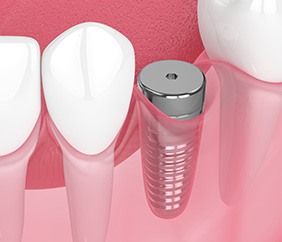

Over the last several decades, dental implant treatment has been nearly perfected, boasting an astounding 95 percent success rate, even after 10 years of placement. Their unique design allows patients to rebuild the entire structure of their missing teeth, not just the visible part. This unique feature means that patients can optimize the function, health, and appearance of their smile. You can learn whether you’re a good candidate for tooth replacement with dental implants in Mankato, MN by scheduling a consultation with one of our dentists today!


Dental implants themselves are small, titanium posts that are surgically placed below the gumline and into the jawbone. Due to their biocompatible nature, they’re able to undergo a process called osseointegration, where they chemically fuse with the bone, just like your natural teeth roots once were. This allows the implants to provide stimulation and blood flow to the area to keep it from eroding, and offers a strong and stable foundation for dental prosthetics to be secured to.
Dental implants offer a wide range of benefits that you can’t experience with dental bridges or traditional dentures. This is because they are the only tooth replacement option out there that restores the roots of the missing teeth, keeping the jawbone strong and healthy. To achieve this, getting dental implants requires a multi-step process that includes a surgical procedure. Everyone’s treatment looks a little different, but here are the four steps everyone can expect.

During your initial consultation, Dr. Hampen or Dr. Hyland will conduct a thorough examination of your oral cavity and ask you about your medical history to help determine whether dental implants are the right choice for you. Some patients need preliminary treatments before they are able to get dental implants, like gum disease treatment and bone grafting. If any of these apply to you, we can help you to get them scheduled. Once your jaw and gums are in good shape, we’ll create a custom-tailored treatment timeline so you know exactly what to expect throughout the process.

We want to make sure all of our patients are getting the best quality of care. That’s why we partner with local, expert oral surgeons and periodontists to place your dental implants. After numbing the area with a local anesthetic, an incision is made into the gum tissue. Then, each dental implant is placed at a strategic location and angle for optimal success. The gum tissue is closed, and protective caps are placed over them to keep them safe throughout the healing process.

After your surgery, you’ll undergo a healing and osseointegration period, where your implants will fuse with your jawbone. This can take anywhere from three to six months. Once that’s complete, we’ll attach small, metal connector pieces to your implants, called abutments. Impressions are also taken so your restoration(s) can be custom-crafted for you at the dental laboratory.

Once your final restoration arrives at our dental office, we’ll call you back in to secure it to your abutments and complete your smile. If everything looks and feels great, you will be free to show off your new grin to the world!

Dental implants boast a wide array of unique benefits that make them a popular tooth replacement treatment among patients. Some of the advantages that you’ll be able to enjoy include:

Dental implants are a versatile tooth replacement option that can help patients who are missing one, several, or all of their teeth. However, certain oral or medical condition can set back the process, such as gum disease. If this is the case in your situation, you may require preparatory procedures, like gum disease therapy, a bone graft, or other treatments to get the health of your mouth back on the right track. This will ensure successful dental implant surgery results and increase the lifespan of your restorations down the road. Then, we can walk you through how we plan to restore your smile.

For a single missing tooth, our team will place one dental implant below the gumline to replace the root. Once the implant has fused with the jawbone, we can place the abutment, followed by a customized dental crown to fill the space in the arch.

Instead of having to alter the structure of your natural, healthy teeth by placing a traditional dental bridge, our team can secure two dental implants to either side of the gap in your smile. This will hold your restoration securely in place—no alteration of your existing teeth necessary.

Traditional dentures utilize natural suction to stay in place, but that isn’t always enough for some people to confidently speak and chew. Instead, we can secure your denture to anywhere from four to eight dental implants placed along your arch to hold them in place and allow them to function and look like natural teeth.

Dental implants offer lifelike, long-lasting results, and these effective smile restorations require patients to make a larger investment of time and money upfront than other solutions. Since no two treatment plans are exactly alike, our team at Hyland Dental will walk you through every step and the price associated with each before we begin restoring your smile. With this in mind, keep reading to learn some of the factors that influence the cost of dental implants in Mankato, and contact our team with any further questions.

If you have existing oral health problems, you'll likely need preliminary treatments before moving forward with the dental implant process. Even though services like gum disease therapy, tooth extractions, and bone grafting will add to the overall cost of your treatment, depending on your case they can be necessary to maximize the lifespan of your new smile. Fortunately, most of them are partially covered by dental insurance.
Keep in mind that dental implant surgery has a cost of its own. We are partnered with the best local oral surgeons who specialize in implant placement, so you can rest assured that you are investing in what will be a quality result for your smile.

When it comes to dental implants in Mankato, the cost is affected by multiple factors including:

Patients on a budget often choose dentures or dental bridges as their method of tooth replacement because they’re cost-effective. Even though dental implants have a higher upfront cost, they end up paying for themselves over time. For example, you won’t need to spend on replacements or adjustments every few years.
You also don’t have to worry about purchasing special pastes, solutions, or other products to maintain your rebuilt grin. All you must do is care for your implants like you would for your natural teeth! Since they’re easier to maintain, you can more easily avoid oral health issues that would require costly dental treatment.

Most dental insurance plans do not offer coverage for dental implants. However, there are some exceptions. Certain parts of the final restoration or your preliminary treatments might be eligible for coverage. Before committing to anything, contact your insurance provider to confirm the details of your coverage. Our team is happy to help with that step if needed!

Don’t have dental insurance? No problem! We work with third-party financiers to help make your dental bills much easier to manage. With CareCredit, you can sign up for low-to-no-interest payment plans to break up the overall cost of your treatment into smaller monthly installments.
Also, we offer an in-house dental plan customized to the needs of patients – simply ask us during your next visit to learn more. If you’re ready to upgrade your smile, contact our team to schedule your appointment with an implant dentist in Mankato today.

Dental implants are now considered the gold standard of tooth replacement, and it’s easy to see why. Many patients choose to invest in this modern tooth loss solution because of its longevity. These unique prosthetics have the ability to last decades, sometimes even a lifetime! Of course, that’s only the case if they’re properly cared for. The good news is that caring for your dental implants in Mankato is fairly simple. To help you out, our team at Hyland Dental has compiled a list of simple precautions you can follow to keep your newly rebuilt smile in its very best shape for life.

The most common reason for dental implant failure is an infection in the gum tissue. Luckily, you can easily prevent it by practicing good oral hygiene. Brushing twice a day, flossing daily, and rinsing every day with an ADA-approved mouthwash are excellent practices that can help keep your smile in great condition.

One of the most significant advantages of dental implants is that they can withstand the chewing of virtually any food. Since the titanium posts replace the entire structure of your missing teeth, they allow you to chew through almost anything with ease. However, you should avoid overindulging in sugary, starchy, or acidic foods as they can lead to the accumulation of harmful oral bacteria and contribute to implant failure. Instead, you should eat fresh fruits, vegetables, lean proteins, dairy products, and whole grains to keep your grin strong and healthy.

Do not use your implants for anything other than chewing! Poor habits like smoking, using your teeth as tools, chewing on pens or pencils, and biting your fingernails could easily cost you a trip to your emergency dentist in Mankato. If you need help quitting these habits, don’t hesitate to ask us for help. We’ll provide you with the support, resources, and guidance you need to make the feat as easy as can be.

Although dental implants are strong, they’re not indestructible. If you regularly play sports, you should ask our team about a custom-made athletic mouthguard. It’ll protect your teeth from any impact should you sustain a blow to the face. On the other hand, if you grind your teeth at night, you can wear a custom nightguard to keep your enamel safe.

It’s strongly recommended that you visit our team every six months for a checkup and cleaning. At every routine appointment, we’ll make sure your implants and remaining teeth are in tip-top shape. If there are any problems, we can address them before they turn into painful complications down the line. Plus, these visits are a great opportunity to ask us any further questions you may have about maintaining your implants.

If you suffer from extensive tooth loss, you may be thinking about rebuilding your smile with dental implants in Mankato. You can review the information above to determine whether this method of tooth replacement is right for you. However, it’s completely normal to have a few concerns about the process before committing to it. To help you, our team at Hyland Dental has decided to answer some frequently asked questions from patients. Of course, if you don’t see your question, feel free to contact our team!
For most patients with good health, dental implants are very successful when placed by a qualified professional. If you have low jawbone density or gum disease, your implant dentist in Mankato can fix these problems to make dental implant surgery safer and more successful. If you have diabetes, cancer, or other medical conditions that could make surgery/healing risky, we can discuss that during your consultation.
How Long Do Dental Implants Last?
Dental implants are one of the most permanent solutions for missing teeth, capable of lasting well over 30 years. Of course, their exact lifespan depends heavily on your oral health and lifestyle. You can help your upgraded smile’s durability by brushing twice a day along with daily flossing and rinsing with an ADA-approved mouthwash. Make sure you visit our dental team every six months for a checkup and cleaning as well!
It depends on how many implants you’re receiving at once. Generally, placing a single implant takes 1-2 hours. This includes the time needed to administer anesthesia and dress you for a sterile surgical atmosphere.
Do Dental Implants Feel Natural?
Once they are placed in the jawbone, dental implants will feel exactly like the roots of your original teeth. The implants themselves have no nerve endings. Any sensations that you feel in that area – like heat, cold, or pressure – come from the gums surrounding the implants.
What Can Cause Dental Implants to Fail?
Dental implants usually fail for one of two reasons: peri-implantitis and failed osseointegration. Peri-implantitis is a type of gum disease that develops from poor oral hygiene, damaging the jawbone and soft tissue. Meanwhile, failed osseointegration is exactly as the name implies – when the implant fails to integrate with the jawbone successfully. A few other causes of dental implant failure include chronic teeth grinding, poor oral hygiene, certain medications, and health conditions like diabetes and cancer.
Will I Have to Take Off Work for Dental Implant Surgery?
In most cases, patients typically only need to take a day or two off work to get dental implants. Of course, every case is unique, meaning the exact amount of time you’ll need to take off will be based on your specific situation. If you work a physically demanding job, you should ideally take three to four days off. Strenuous exercise could divert blood from the implant site and delay healing.